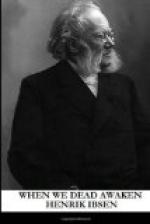PROFESSOR RUBEK.
[Looks impressively at her.] I was an artist, Irene.
IRENE.
[Darkly.] That is just it. That is just it.
PROFESSOR RUBEK.
An artist first of all. And I was sick with the desire to achieve the great work of my life. [Losing himself in recollection.] It was to be called “The Resurrection Day”—figured in the likeness of a young woman, awakening from the sleep of death—–
IRENE.
Our child, yes—–
PROFESSOR RUBEK.
[Continuing.] It was to be the awakening of the noblest, purest, most ideal woman the world ever saw. Then I found you. You were what I required in every respect. And you consented so willingly—so gladly. You renounced home and kindred—and went with me.
IRENE.
To go with you meant for me the resurrection of my childhood.
PROFESSOR RUBEK.
That was just why I found in you all that I required—in you and in no one else. I came to look on you as a thing hallowed, not to be touched save in adoring thoughts. In those days I was still young, Irene. And the superstition took hold of me that if I touched you, if I desired you with my senses, my soul would be profaned, so that I should be unable to accomplish what I was striving for.—And I still think there was some truth in that.
IRENE.
[Nods with a touch of scorn.] The work of art first—then the human being.
PROFESSOR RUBEK.
You must judge me as you will; but at that time I was utterly dominated by my great task—and exultantly happy in it.
IRENE.
And you achieved your great task, Arnold.
PROFESSOR RUBEK.
Thanks and praise be to you, I achieved my great task. I wanted to embody the pure woman as I saw her awakening on the Resurrection Day. Not marvelling at anything new and unknown and undivined; but filled with a sacred joy at finding herself unchanged—she, the woman of earth —in the higher, freer, happier region—after the long, dreamless sleep of death. [More softly.] Thus did I fashion her.—I fashioned her in your image, Irene.
IRENE.
[Laying her hands flat upon the table and leaning against the back of her chair.] And then you were done with me—–




